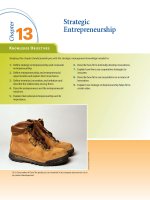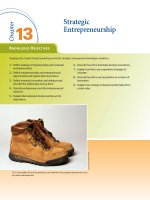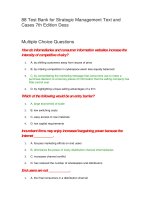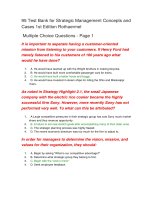Lecture Dalrymple''s sales management: Concepts and cases – Chapter 11: Motivating salespeople
Bạn đang xem bản rút gọn của tài liệu. Xem và tải ngay bản đầy đủ của tài liệu tại đây (1.35 MB, 44 trang )
Part V
SALES FORCE LEADERSHIP
Chapter 11:
Motivating
Salespeople
What is Motivation?
Drive to initiate an action.
The intensity of effort in an action
The persistence of effort over time.
Reasons for Motivating Salespeople
Frequent rejection
Physical separation from company
support
Direct influence on quality of sales
presentation
Indirect influence on performance
What Goals are Most Important?
Expand Visibility
of Sales
43.9%
Increase
Sales Revenue
66.1%
Enhance Company
Credibility
31.9%
Build the Brand
29.8%
0
20
40
60
80
How Successful Were You at
Reaching Your Goals?
Expand Visibility
of Sales
Increase
Sales Revenue
Enhance Company
Credibility
Build the Brand
35.7%
64.7%
27.9%
72.1%
41.9%
58.1%
31.8%
68.1%
Most Successful
Least Successful
Maslow’s Hierarchy of Needs
SelfActualization
SelfEsteem
Intense job challenge, full potential, full
expression, creative expansion.
Achievement, respect, recognition,
responsibility, prestige, independence,
attention, importance, appreciation.
LoveBelonging
Belonging, acceptance, love, affection,
family and group acceptance, friendships.
SafetySecurity
Security, stability, dependency, protection,
need for structure, order, law, tenure,
pension, insurance.
Physiological
Hunger, thirst, reproduction, shelter,
clothing, air, rest.
An Exercise to Determine Your
Motivational Needs
To perform the exercise, read through the following statements…check those which are most important in
motivating you to do your best work. Select the ten most important statements.
629
847
333
311
836
151
937
743
431
819
458
757
828
735
949
234
616
146
539
341
132
Job security
Being trusted to do my job the way I think it should be done.
Participating in work group conversations.
Having adequate shelter to protect from the elements.
Having a job which allows me time with my family.
Having an opportunity for personal growth.
Socializing with my friends.
Being considered for an advancement opportunity.
Working with other people.
Having children.
Doing something meaningful with my life.
Being in a position to contribute new ideas.
Having an associate that looks out for my interests.
Including other people in what I do.
Being selected for an exclusive award.
Being involved with work associates in social and recreational activities.
Being sexually satisfied.
Having a responsible person tell me when I’ve done a good job.
Having an active part in work related social activities.
Knowing that other people respect me and my work.
Acceptance as a work group member.
Your Score
To Determine Results:
The statements are divided into five categories intended to
represent the five levels in Maslow’s Hierarchy of Needs.
The second digit in each statement number indicates the
category. These categories are:
1.
2.
3.
4.
5.
Physiological,
SafetySecurity,
LoveBelonging,
SelfEsteem,
SelfActualization.
Count up the number you have in each category then
calculate the percentages for each category. The categories
with the highest percentages would be your personal
motivational drivers.
Maslow’s Needs & Related Sales
Force Motivators
Maslow’s
Hierarchy
Of Needs
SELF
ACTUALIZATION
Motivators
ESTEEM
Recognition programs
BELONGING
President’s Club $1 million
SAFETY &
SECURITY
Job security and fringes
PHYSIOLOGICAL
Cash wages and bonuses
Challenging tasks calling for creativity
Chinese Culture
Hierarchy of Needs
Selfactualization
in service to society
Safety
Physiological
Affiliation (belonging)
Maslow’s Hierarchy
U.S. SALESPEOPLE’S RESPONSES
Number
Percent
Number
Percent
847
86%
431
51%
955
80%
654
40%
341
74%
722
39%
352
66%
836
37%
256
63%
458
37%
559
57%
853
37%
757
54%
718
34%
Comparison of Motivators and Hygiene
Factors Percentage Frequency
Low
Satisfaction
High
Satisfaction
40 30 20 10 0 10 20 30 40
Hygienes
Policies
Tech. Supervision
Salary
Interpersonal Relations
Working Conditions
Motivators
Achievement
Recognition
Work Itself
Responsibility
Advancement
Career Stages
Does everyone go through these
stages?
What can be done to address the
concerns of salespeople at each stage?
Exploration Stage
Motivational Needs
–
Learning the skills required to do the job well.
Manager Role?
Exploration Stage
Motivational Needs
–
Learning the skills required to do the job well.
Manager Role?
–
Reinforce accomplishments
–
Spend time with salesperson
–
Discuss longterm benefits of working for the organization
Establishment Stage
Motivational Needs
–
Use skills to produce results, increase job autonomy
Manager Role?
Establishment Stage
Motivational Needs
–
Use skills to produce results, increase job autonomy
Manager Role?
–
Provide high rewards for high achievers
–
Have salespeople recognize success has something
other than promotion
Maintenance Stage
Motivational Needs
–
Develop a broader view of work and organization,
maintain a high level of performance
Manager Role?
Maintenance Stage
Motivational Needs
–
Develop a broader view of work and organization,
maintain a high level of performance
Manager Role?
–
Challenge salespeople to use their knowledge in new ways
–
Introduce significant rewards for mastering new challenges
Disengagement Stage
Motivational Needs
–
Establish a stronger selfidentity outside of work,
maintain performance level
Manager Role?
Disengagement Stage
Motivational Needs
–
Establish a stronger selfidentity outside of work,
maintain performance level
Manager Role?
–
Maintain focus on personal goals and importance of
organizational citizenship behaviors (e.g., being a
role model, assist in other aspects of the organization)
Career Stage Effects on Satisfaction
Select Research Findings:
All stages are least satisfied with promotion
and pay
–
However, pay satisfaction is only dimension on which
disengagement salespeople are more satisfied than establishment or
maintenance salespeople
Maintenance salespeople are less satisfied
with supervision than are establishment
salespeople
Disengagement as well as maintenance
occurs quite early for some people Is this a
management concern?
Overlap of Ages on Career Stages
Career
Concerns
Proportion of
Sales Force
Exploration
14%
Establishment
29%
Maintenance
42%
Disengagement
15%
Age Range
20 30 40 50 60 65
Giving Status to Salespeople
1.
Compensation
exceed firstline managers
2.
Job Title
no cost but considerable payback
3.
Company Car Upgrade
salespeople spend much time in car
reminds them of their value.
4.
Car Phone –
justified on a purely business basis
Giving Status to Salespeople
5.
Field Sales Council
meet president for 1/2 day openended discussion on
field marketing conditions report back to field meetings
the results
6.
Outside Secretarial Support
or more exclusive central.
7.
Published Success Stories
high form of recognition
8.
Task Force Assignments
e.g., review of all paperwork.









